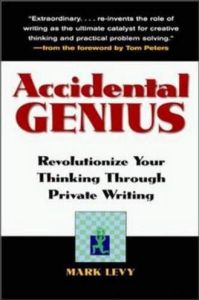Join getAbstract to access the summary!

Join getAbstract to access the summary!
Mark Levy
Accidental Genius
Revolutionize Your Thinking Through Private Writing
Berrett-Koehler, 1998
What's inside?
Forget punctuation, grammar and spelling! If you want to tap into your hidden genius in order to solve your business problems, capture your thoughts on paper...without an audience.
Recommendation
Mark Levy’s short, snappy guide teaches you private writing, which opens the door to expressing, exploring and playing with your thoughts freely - without showing them to anyone else. This ongoing exercise is valuable for sparking creativity, imagination and problem solving. Levy’s ideas are presented directly and humorously, with plenty of examples. The author has an extensive background in publishing, particularly sales, which comes through in his style - part sales team rally, part lingo-ridden pep talk. This approach, however, works. getAbstract recommends this book to anyone who would like to explore idea-generating methods, or to apply some structure and purpose to all those notes you’ve been writing to yourself.
Summary
About the Author
Mark Levy is Director of Special Projects at the international book wholesaler, Bookazine. He has been a book publishing sales rep and has been nominated three times for the prestigious Publishers Weekly "Sales Rep of the Year" award. Levy has also written for many newspapers and magazines, including The New York Times. He is a magician who serves as co-creator (with David Pogue) and magic consultant on Magic for Dummies. He is the co-author of another book on magic, Mac King’s Tricks with Your Head, which will be published by Crown. He is a writing, creativity and sales coach who regularly presents seminars and workshops.

















Comment on this summary